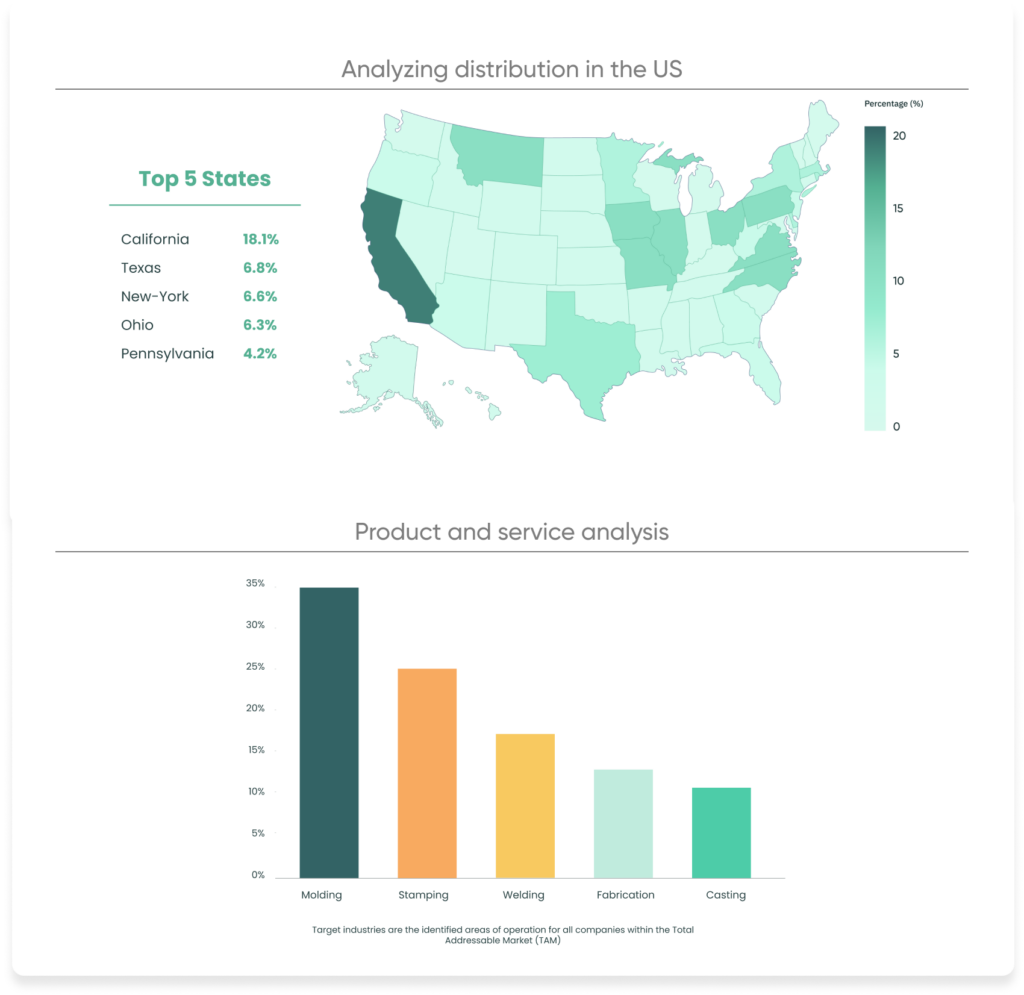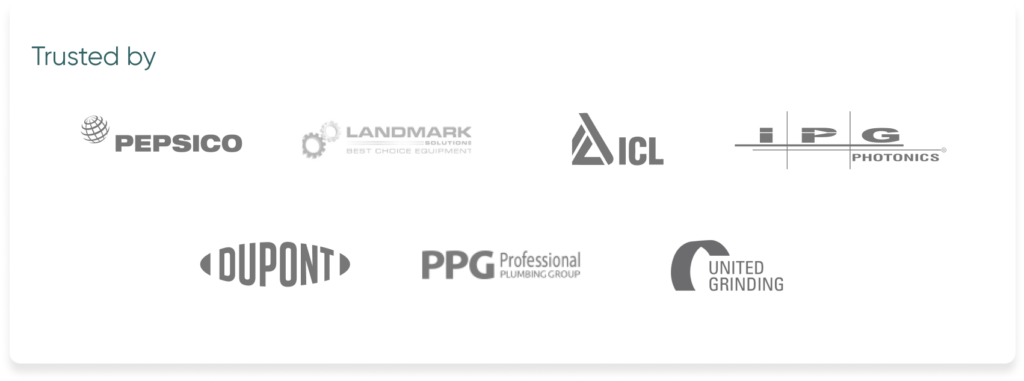Table of Contents
Introduction
Are you looking to accelerate sales in the manufacturing industry? Data-driven prospecting might be the key to unlocking your full sales potential. In today’s highly competitive market, relying on outdated prospecting methods is no longer enough. When used strategically, data can give you the upper hand—helping your sales teams pinpoint the right prospects, boost efficiency, and, most importantly, close more deals.
In this article, we will explore how leveraging data in prospecting leads to improved targeting, increased efficiency, and higher conversion rates, particularly for manufacturers striving to stay ahead of the curve.
The Role of Data in Modern Sales Prospecting
What is data-driven prospecting, and why does it matter for modern sales teams? In simple terms, data-driven prospecting is a sales strategy that empowers you to identify, engage, and convert the most promising leads. Unlike traditional methods—such as calling a random list of contacts from a directory—data-driven prospecting gives you control. It’s like trading in a flashlight for a laser pointer, allowing you to precisely target your efforts.
This transition from cold-calling to data-enhanced prospecting means sales teams can engage high-value leads at the right time with the right message, making your efforts more productive. Manufacturing companies, in particular, benefit from this approach because of the complexity and extended buying cycles often associated with the industry. Data-driven methods allow you to prioritize the best opportunities efficiently rather than waste time on less promising leads.
Critical Benefits of Data-Driven Prospecting
Enhanced Targeting of Prospects
Data-driven prospecting starts by identifying the right audience, enabling sales teams to focus on those with the highest probability of buying. Instead of guessing, you use accurate, verifiable information to ensure that you direct your efforts where they will make the most significant impact.
Imagine having a crystal-clear picture of your ideal customer. By analyzing firmographic, behavioral, and even external data, companies can narrow their search to specific prospects that align perfectly with their offerings. With tools like Explorium, this becomes a reality. As Michael Cleavinger, Commercial Data Lead at PepsiCo, noted, “Explorium gave us access to a large amount of data, allowing us to use it in all the applicable audience segments we were trying to solve.”

With AI-powered solutions, businesses can create precise customer segments based on their needs and preferences. These segments help manufacturers target the right companies and craft messages that resonate. Precise segmentation means fewer wasted calls, more productive conversations, and a greater return on effort.
Improved Lead Qualification
Once you’ve identified your prospects, you must qualify them—quickly. Time is money, and nowhere is this more accurate than in sales. By leveraging data, your sales team can accurately qualify leads, separating those likely to convert from those not worth the effort. This not only makes your efforts more efficient but also reduces the stress of dealing with unproductive leads.

Predictive analytics and lead-scoring tools allow sales teams to rank prospects based on their value and potential. Machine learning algorithms help analyze past customer data and score leads according to their buying readiness, enabling you to make informed decisions, thus reducing the time spent on cold leads and allowing your salespeople to focus on those most likely to generate revenue.
By having data as your “passenger princess,” as some might say, your sales teams don’t have to waste time fumbling with maps or making wrong turns. Instead, they can accelerate right towards high-value opportunities with minimal detours.
Faster Sales Cycles
Data-driven insights do more than improve lead targeting and qualification—they also help shorten the overall sales cycle. In manufacturing, where the buying journey can often be complex and lengthy, making a decision faster can mean everything.
Analyzing customer journey data can reveal which prospects are in the advanced stages of the buying process and ready to make a purchase. This information enables sales teams to prioritize and quickly close deals that interest customers.
Companies like DuPont and IPG have successfully utilized data-driven prospecting to shorten their sales cycles, eliminating weeks of back-and-forth. As a result, they get ahead of competitors who still need to rely on outdated, manual prospecting methods.
Types of Data That Drive Effective Sales Prospecting
The key to successful data-driven prospecting lies in understanding the different types of data that can inform your sales strategy. Each type plays a unique role in elevating your sales processes.

Firmographic Data
Firmographic data forms the foundation of any effective sales strategy. This data includes essential information like company size, industry, revenue, and location—helping manufacturers identify companies that fit their ideal customer profile. For instance, if you’re selling advanced equipment tailored for large-scale production, you’ll want to avoid spending resources on small-scale firms that aren’t suitable buyers.
By utilizing Explorium’s enriched data capabilities, manufacturing firms can quickly pinpoint the right companies, thus ensuring that your sales teams spend time and energy only where it counts.

Behavioral Data
Behavioral data focuses on understanding prospects’ actions—how often they visit your website, what content they interact with, and where they click. This data helps you understand their intent and predict their readiness to buy.
By tracking user behavior, manufacturers can get clear insights into their prospects’ actions, providing valuable information that enables you to engage them effectively. Are they exploring case studies about reducing production costs? Are they frequently visiting a particular product page? These indicators allow sales teams to fine-tune their message, addressing specific needs and concerns.

Machine and Technographic Data
Machine and Technographic data is particularly useful for manufacturers who deal with technology or tools. This data type tells you what machines, technology or platforms a prospect uses.
Understanding a prospect’s machine and tech stack allows you to tailor your approach accordingly. For instance, if a potential client already uses complementary technologies, it’s much easier to highlight how your solution integrates seamlessly, adding value.
External Data
External data provides a broader context by adding information related to industry trends, economic indicators, and even social media activity. Explorium excels at gathering external data, providing a fuller picture of your potential customers.

Imagine being able to target prospects based on their firmographic data and current industry conditions, such as the recent uptick in demand for automated machinery due to labor shortages. This insight is invaluable for manufacturers adapting and capturing opportunities in real-time.
Real-World Applications of Data-Driven Prospecting
Case Study 1: Manufacturing Industry
Effective territory planning ensures your sales teams are focused on the most promising geographic and demographic segments. By using advanced data to refine your market segmentation, you can allocate resources more efficiently and target the regions with the highest growth potential.
A manufacturing client working with Explorium faced a significant challenge: identifying high-value customers in a fast-growing market. Using Explorium’s predictive prospecting tools, the company identified over 10,000 new viable leads within its total addressable market. This resulted in an 18% increase in conversion rates and a boost of $9 million in new business opportunities.
Explorium’s advanced AI models helped the manufacturer focus on high-intent leads, streamlining sales processes and enabling them to grow more efficiently. The transformation improved the sales pipeline and allowed the company to explore new, previously untapped market segments.
Case Study 2: SaaS Industry
A well-known SaaS company also benefited by using Explorium’s enriched data capabilities. The company expanded its reach by leveraging firmographic and technographic data, targeting new customer segments with personalized marketing campaigns. This targeted approach led to more qualified leads entering their sales funnel and, ultimately, better results.
The company’s success highlights how enriched data can do more than identify the right prospects—it can also shape an effective, personalized sales strategy.
Overcoming Challenges in Data-Driven Prospecting
While data-driven prospecting can be transformative, it has its challenges. Issues like data quality and integration often prevent a seamless transition. Manufacturers must ensure that the data they rely on is accurate, up-to-date, and effectively integrated into their systems.
Solutions like data harmonization and automation tools can help overcome these obstacles. Explorium stands out here by simplifying data acquisition and seamlessly integrating internal and external datasets. By providing clean, high-quality data that flows smoothly across different systems, Explorium ensures manufacturers can fully leverage data for better prospecting.
Conclusion

Data-driven prospecting is no longer a “nice to have “but a “must-have” for any manufacturing company looking to stay ahead in an increasingly competitive market. By leveraging firmographic, behavioral, technographic, and external data, sales teams can target the right prospects, qualify leads faster, and close deals quickly
and efficiently.
Explorium’s enriched data capabilities can transform your sales process, helping you unlock insights that drive results and elevate your sales. It’s time to put data in the driver’s seat and watch your sales soar.
Ready to see how data can supercharge your sales prospecting?
Explorium offers enriched data — driven solutions that enable you to target your ideal customers and drive more sales faster. Explore our case studies to see how we’ve helped companies boost their sales performance — or better yet, connect with us for a personalized demo to learn how you can leverage data for a competitive edge today!


